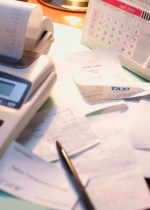Preparing for an audit
There is nothing “random” about audits undertaken by the Australian Taxation Office (ATO). Since the ATO completed a significant upgrade of its computer systems in 2010, continued investment in this area has made the organisation’s data matching capacity sophisticated, automatic and easy to perform.

Each year, the ATO releases details of its annual compliance program and the actions it plans to take to deter, detect and deal with those who do not meet their tax and superannuation responsibilities.
Medical practitioners were targeted under the ATO’s 2011–12 compliance program, along with footballers, real estate agents, coffee shop owners and individuals with incomes exceeding $1 million, especially those using closely-held entities, such as charitable trusts and self-managed superannuation funds (SMSFs).
This year, the ATO is focusing on high-income earners who invest in financial products. The ATO has singled out investments by medical practitioners and other high-income individuals as an area that will receive particular attention.
Taxpayers with widely marketed financial products that promise substantial tax benefits have been advised to be careful and ensure that the investment is covered by a product ruling and is well thought out.
A good strategy is to conduct your affairs as though you will one day be audited by the ATO. As such, you should:
-
be careful when entering transactions with taxation implications, and
-
assume that the transaction will be scrutinised by the ATO.
You should document, execute and record all relevant transactions. In some cases, it may be appropriate to obtain a public or private ATO ruling if you are unsure about a specific transaction.
You should keep all relevant documents and file them in a manner that will help you retrieve records efficiently during an audit.
So what can you expect if you’re audited?
During an audit, the ATO:
-
will examine your tax affairs and records to ensure that reported information is accurate and to confirm your tax liability;
-
may examine the tax records of other people in order to shed light on your tax position;
-
may cross-check data against different sources, such as interest-payment records forwarded by financial institutions;
-
may send ATO officers to visit your premises (or that of a third party) to examine records.
In addition to informal requests, the ATO has the power to access and examine your documents and to require you or a third party to provide information, evidence or documents. If you do not provide information or documents that the ATO has requested, you cannot use these documents when disputing an assessment of income tax.
If you discover an honest mistake before or during an audit, you can voluntarily disclose this to the ATO. This can result in a reduced penalty being imposed.
At the conclusion of the audit, the ATO will explain the basis for any decisions and any adjustments made to your taxation affairs. You will be given an opportunity to explain circumstances that you believe could justify a reduction of any penalty or interest.
If you are served with a reassessment of your tax liability as a result of the audit, you can object, but you must provide evidence to support your appeal.


